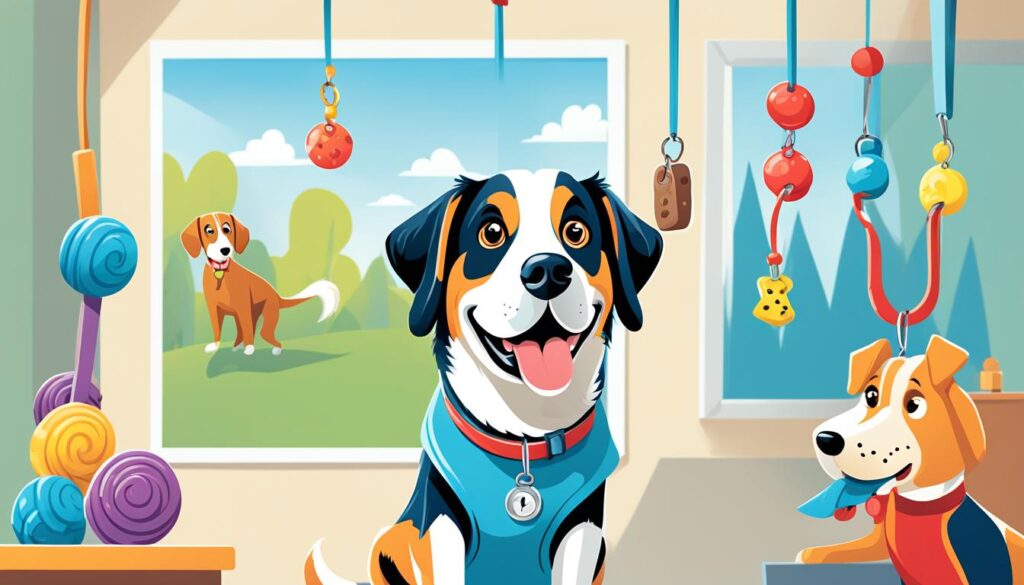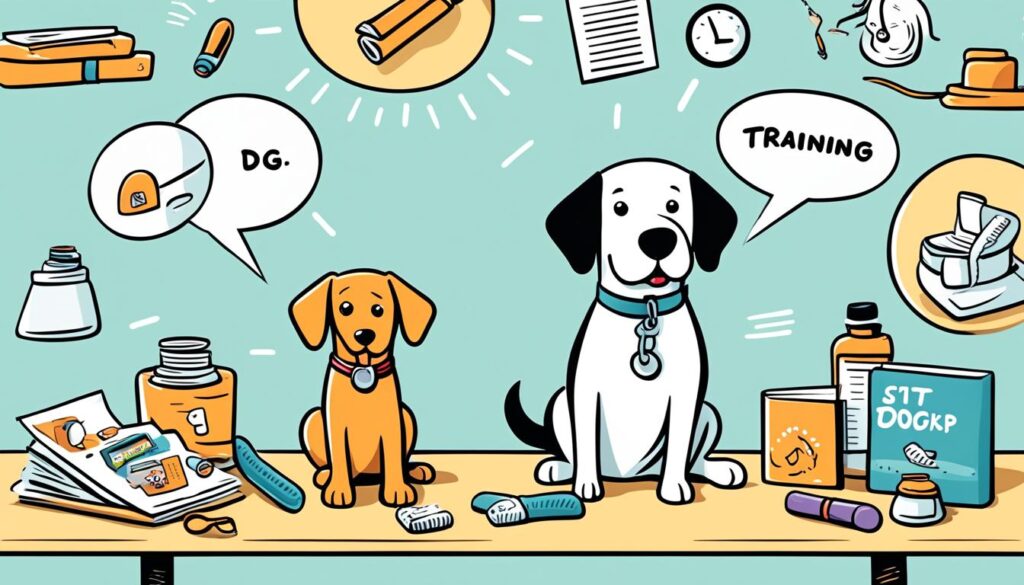Barking Up the Right Tree: Canine Health

Did you know that proper training and behavior management can significantly impact a dog’s overall health and well-being? Ensuring optimal dog wellness goes beyond regular vet visits and a balanced diet. It involves understanding how to communicate effectively with our furry companions to establish a strong bond and promote positive behaviors that contribute to their overall happiness and longevity.
Key Takeaways:
- Positive reinforcement techniques can revolutionize dog training and improve canine health.
- Lure reward training offers a quick and effective way to teach dogs desirable behaviors.
- Incorporating games and praise into dog training enhances mental stimulation and strengthens the bond between owner and dog.
- Comprehensive training that addresses all aspects of a dog’s behavior leads to long-term success.
- Early socialization plays a crucial role in a dog’s development and contributes to their overall well-being.
The Power of Positive Reinforcement in Dog Training
Dr. Ian Dunbar’s book, “Barking Up the Right Tree,” highlights the effectiveness of positive reinforcement in dog training. Unlike aversive punishment techniques, positive reinforcement focuses on rewarding dogs for desirable behavior rather than punishing them for misbehavior. This approach not only improves obedience but also enhances the overall well-being and happiness of our furry friends.
Positive reinforcement training utilizes rewards to encourage dogs to repeat desired behaviors. By associating positive experiences and rewards with specific actions, dogs learn to actively engage in behaviors that elicit positive outcomes, making training a pleasurable experience for both the dog and the owner.
Positive reinforcement techniques include:
- Verbal praise: Offering heartfelt and enthusiastic verbal affirmation when the dog exhibits desirable behavior reinforces their actions and motivates them to continue performing in a similar manner.
- Treats and life rewards: Providing small, tasty treats or access to life rewards such as playtime, sniffing, or going for a walk reinforces positive behavior and encourages dogs to repeat these actions in the future.
- Clicker training: Using a clicker as a form of communication, dog owners can mark and identify the exact moment a desired behavior occurs. Accompanied by a reward, the click sound becomes highly rewarding for dogs, leading to faster and more reliable learning.
The Effects of Positive Reinforcement Training
Positive reinforcement training techniques have proven to be highly effective in achieving long-term results. By focusing on rewards rather than punishments, dogs develop a positive association with training, leading to improved engagement, enthusiasm, and willingness to learn.
Furthermore, positive reinforcement training strengthens the bond between dogs and their owners. It creates an environment of trust, respect, and open communication that fosters a harmonious relationship based on mutual understanding and cooperation.
Dr. Dunbar’s advocacy for positive reinforcement training aligns with the principles of operant conditioning, a theory in behavioral science that emphasizes the importance of reinforcement in shaping behavior. By rewarding desirable actions, dog owners can guide their furry companions towards exhibiting behaviors that are not only socially acceptable but also promote their overall well-being.
“Positive reinforcement is highly effective in training dogs because it focuses on rewarding their desirable behavior instead of punishing misbehavior. By using rewards such as treats, praise, and play, we can shape our dogs’ behavior in a positive and meaningful way.” – Dr. Ian Dunbar
Implementing positive reinforcement techniques in dog training provides a solid foundation for establishing desirable behavior patterns. As dogs learn through positive experiences and the anticipation of rewards, they become more attentive to their owners’ cues, making training sessions more productive and enjoyable for both parties involved.
By embracing positive reinforcement and reward-based training methods, dog owners can effectively address behavioral issues, strengthen the human-animal bond, and promote optimal canine health and well-being.
The Importance of Lure Reward Training
In “Barking Up the Right Tree,” Dr. Ian Dunbar highlights the value of lure reward training for dogs. This method, rooted in behavioral science, utilizes verbal cues and rewards to teach dogs specific responses. Unlike traditional aversive punishment techniques, lure reward training focuses on positive reinforcement, creating a harmonious training environment.
The essence of lure reward training lies in its quick and easy approach. By using enticing rewards, such as treats or playtime, alongside clear verbal cues, dog owners can effectively communicate desired behaviors to their furry companions. This method capitalizes on the dog’s natural instincts and desire for rewards, making the training process engaging and enjoyable for both parties.
Backed by decades of behavioral science research, Dunbar’s advocacy for lure reward training is supported by empirical evidence. Studies consistently show that positive, reward-based methods yield quicker and more reliable results compared to punitive techniques. By harnessing the power of positive reinforcement, dog owners can address misbehavior and noncompliance without resorting to raising their voices or using punishment.
Using lure reward training allows dog owners to foster a strong bond with their canine companions while promoting optimal canine health. The emphasis on rewards and positive reinforcement not only encourages desirable behavior but also strengthens the human-dog relationship. This approach creates a happy and well-behaved dog, ensuring a lifetime of companionship and shared adventures.
“Lure reward training offers a win-win solution for both dogs and their owners. By utilizing positive reinforcement and rewards, we can effectively shape behavior, build trust, and create a strong bond with our furry friends.”
– Dr. Ian Dunbar
The Benefits of Lure Reward Training:
- Quick and easy training process
- Effective addressing of misbehavior and noncompliance
- Strengthens the human-dog bond
- Promotes optimal canine health and well-being

Real-Life Success Story: Oscar’s Journey
| Training Phase | Methods Used | Results |
|---|---|---|
| Potty Training | Lure reward training with treats | Oscar learned to eliminate outside within a week |
| Basic Commands | Lure reward training paired with positive reinforcement | Oscar quickly mastered “sit,” “stay,” and “lie down” |
| Leash Walking | Lure reward training with praise and treats | Oscar now walks calmly on a leash without pulling |
The Role of Games and Praise in Dog Training
In “Barking Up the Right Tree,” Dr. Ian Dunbar emphasizes the importance of incorporating games and praise into dog training. Games provide mental stimulation, engage dogs in learning activities, and reinforce desired behaviors. Additionally, Dunbar highlights the power of praise in motivating and rewarding dogs. Positive reinforcement techniques, including games and praise, help build a strong bond between dogs and their owners and contribute to overall canine well-being.
Games play a crucial role in dog training as they provide an opportunity for dogs to learn and practice new skills in a fun and interactive way. By engaging dogs in mentally stimulating activities, games keep them physically and mentally active, preventing boredom and destructive behavior. Incorporating training exercises into games ensures that dogs associate learning with positive experiences, making them more motivated to participate and excel.
Praise is a simple yet powerful tool in dog training. When used effectively, praise reinforces good behavior and encourages dogs to repeat those actions. Dogs thrive on positive attention, and offering sincere, enthusiastic praise for their achievements strengthens their bond with their owners. Additionally, praise acts as a form of reward, providing dogs with the emotional satisfaction they seek.
“Games provide dogs with mental stimulation, while praise offers powerful reinforcement, creating a positive training environment,” says Dr. Ian Dunbar.
Positive reinforcement techniques, such as using games and praise, are highly effective in dog training. Unlike punitive methods that can cause fear or anxiety, positive reinforcement focuses on rewarding desired behaviors, encouraging dogs to perform them consistently. By consistently using games and praise to reinforce good behavior, dog owners can create a harmonious and well-behaved canine companion.
Comprehensive Dog Training for Long-Term Success
Dunbar’s book, “Barking Up the Right Tree,” emphasizes the importance of comprehensive dog training that addresses all aspects of a dog’s behavior. By providing structured and thorough training, dog owners can effectively modify their pet’s behavior and ensure long-term success in their training efforts.
To achieve comprehensive dog training, it is crucial to teach puppies and dogs when, where, what, and how to engage in various activities. This includes teaching them appropriate chewing habits, proper digging behaviors, controlled barking, and suitable playtime interactions. By establishing clear guidelines and expectations, dogs can learn and exhibit desired behaviors consistently.
The key to comprehensive dog training lies in utilizing both classical conditioning and operant conditioning techniques. Classical conditioning focuses on teaching dogs to associate specific stimuli, such as verbal cues or hand signals, with particular actions or behaviors. On the other hand, operant conditioning involves rewarding desired behaviors and redirecting or discouraging undesired behaviors.
“Behavior modification is a crucial component of comprehensive dog training,” Dunbar explains. “By identifying and addressing underlying behavior issues, we can work towards a well-behaved and balanced dog companion.”
Response reliability is another critical aspect of comprehensive dog training. It refers to a dog consistently exhibiting the desired behaviors in various situations and environments. Through consistent reinforcement of specific commands and behaviors, dog owners can develop a reliable response from their furry friends, ensuring their training translates into real-life scenarios.

By providing comprehensive dog training, dog owners can create a harmonious and well-behaved dog. This training approach promotes effective behavior modification, enhances response reliability, and fosters a strong bond between dog and owner.
The Impact of Socialization on Canine Health
In “Barking Up the Right Tree,” Dr. Ian Dunbar highlights the crucial role of early socialization in promoting optimal canine health. Socialization is the process of exposing puppies to various stimuli, including other animals and humans, to help them develop positive relationships and adapt to different environments. Early socialization has numerous benefits, such as reducing the risk of fear and aggression, improving behavior and confidence, and enhancing the overall well-being of dogs.
The Importance of Puppy Socialization
Puppy socialization is a critical phase in a dog’s development, usually occurring between 3 and 14 weeks of age. During this period, puppies are highly receptive to new experiences and are more likely to form positive associations. By exposing them to a variety of people, animals, sounds, and environments, owners lay the foundation for a well-adjusted adult dog.
By engaging in positive socialization experiences, puppies learn to tolerate and enjoy different situations, which reduces the likelihood of fear and anxiety in the future. They become more adaptable, confident, and capable of handling the challenges of everyday life. Additionally, early socialization significantly improves their ability to communicate and interact with both humans and other dogs, resulting in a harmonious and well-behaved companion.
Understanding a Puppy’s Pedigree
Understanding a puppy’s pedigree is another crucial aspect of socialization and training. A puppy’s pedigree provides valuable insights into their genetic heritage, including behavioral tendencies and predispositions. By gaining knowledge about the breed’s characteristics and potential challenges, owners can tailor their socialization and training techniques to meet their puppy’s specific needs.
For example, certain breeds may have a strong prey drive, while others may be more prone to anxious behavior. Being aware of these traits allows owners to create appropriate socialization experiences and provide targeted training to address any potential issues. By understanding a puppy’s pedigree, owners can set realistic expectations and devise effective strategies for promoting their puppy’s well-being.
The Benefits of Early Socialization
Early socialization has far-reaching benefits for both puppies and their owners. It establishes a solid foundation for future training, facilitates better behavior in different environments, and helps prevent potential behavior problems. Well-socialized puppies are more likely to develop into confident, well-adjusted adult dogs who thrive in various situations.
Furthermore, early socialization can prevent or reduce the risk of fear-based aggression. Exposing puppies to new experiences and positive interactions during the critical development period helps them build positive associations and learn appropriate social cues. This mitigates the likelihood of fear aggression later in life, making them safer and more enjoyable companions for their owners and society as a whole.
It is essential to prioritize early socialization and consider it an integral part of a puppy’s upbringing. By providing them with positive experiences and exposure to different stimuli, owners can promote healthy development, minimize behavior problems, and lay the groundwork for a lifetime of joyful companionship.
“Early socialization is key to raising a well-rounded and confident dog. Taking the time to introduce puppies to a variety of people, places, and experiences sets them up for success in the future.” – Dr. Ian Dunbar
Conclusion
“Barking Up the Right Tree” by Dr. Ian Dunbar offers dog owners valuable insights into effective dog training techniques and promoting optimal canine health. By emphasizing positive reinforcement, lure reward training, games, praise, and comprehensive training, Dunbar provides a comprehensive guide for dog owners to establish a strong bond with their canine companions. This approach creates a harmonious and well-behaved dog, resulting in a happy and thriving furry friend. Guided by Dunbar’s expertise, dog owners can navigate the world of dog training and ensure their four-legged family members enjoy a lifetime of health and well-being.
FAQ
Why is positive reinforcement important in dog training?
Positive reinforcement focuses on rewarding dogs for desirable behavior, which helps to establish clear communication and create a calm, confident, and well-behaved dog companion. Unlike aversive punishment techniques, positive reinforcement promotes optimal canine health and strengthens the bond between dogs and their owners.
What is lure reward training and why is it effective?
Lure reward training involves using verbal cues and rewards to teach dogs specific responses. It is a quick and easy training method that helps dogs understand instructions and exhibit desirable behavior. Lure reward training is backed by decades of behavioral science research and avoids the use of aversive punishment techniques.
How do games and praise contribute to dog training?
Games provide mental stimulation, engage dogs in learning activities, and reinforce desired behaviors. Praise, on the other hand, is a powerful motivator and helps to reward dogs for their good behavior. Both games and praise are positive reinforcement techniques that contribute to a strong bond between dogs and their owners and overall canine well-being.
What does comprehensive dog training involve?
Comprehensive dog training addresses all aspects of a dog’s behavior, including teaching them when, where, what, and how to engage in various activities. It combines classical conditioning and operant conditioning to effectively modify behavior and temperament. Response reliability is also important, ensuring that dogs consistently exhibit desired behaviors in different situations.
Why is early socialization important for puppies?
Early socialization plays a vital role in a puppy’s overall well-being and helps them develop positive relationships with other animals and humans. Understanding a puppy’s pedigree can provide insights into their behavioral tendencies and help owners tailor their training techniques accordingly. Positive experiences and exposure to various stimuli during socialization contribute to healthy development and optimal canine health.
Source Links
- https://www.dogwise.com/barking-up-the-right-tree-the-science-and-practice-of-positive-dog-training/
- https://thepetcarereport.com/video/barking-up-the-right-tree-dog-training-101-with-dr-ian-dunbar
- https://www.poodleforum.com/products/barking-up-the-right-tree/60f2f450a15beadb94e382d677d91df8875c41db/